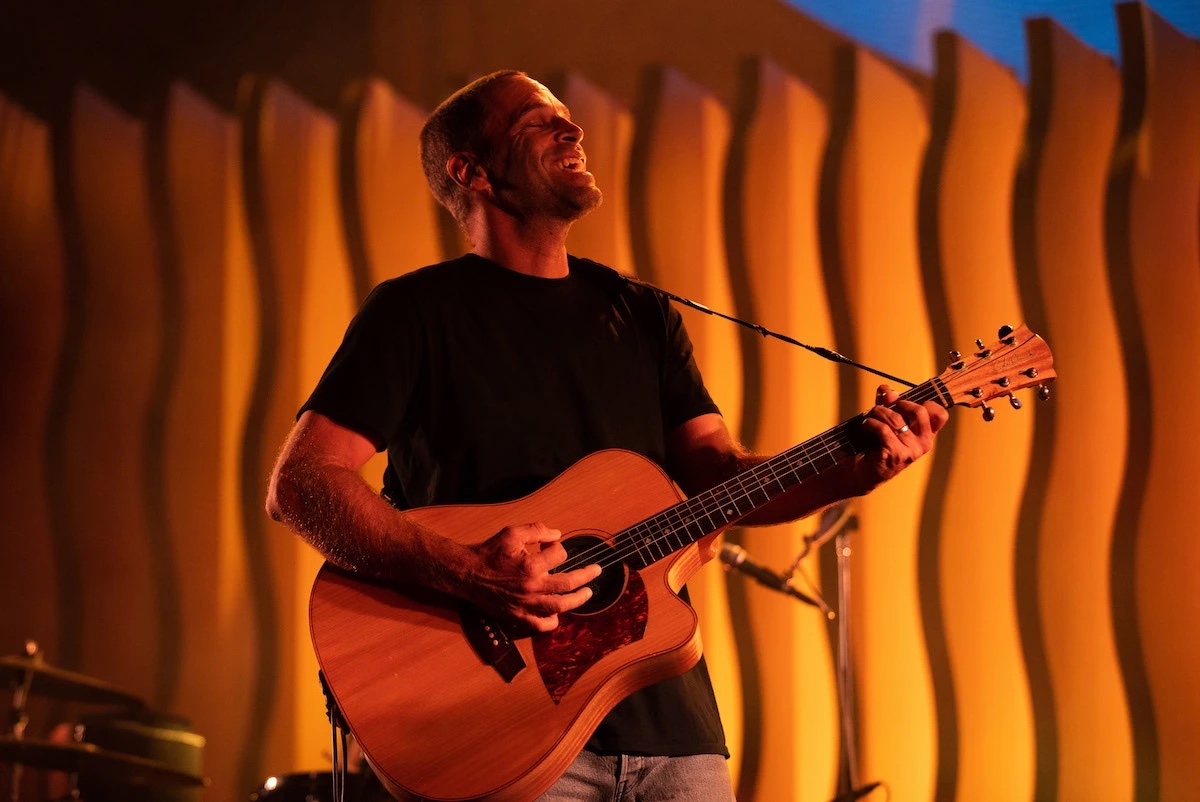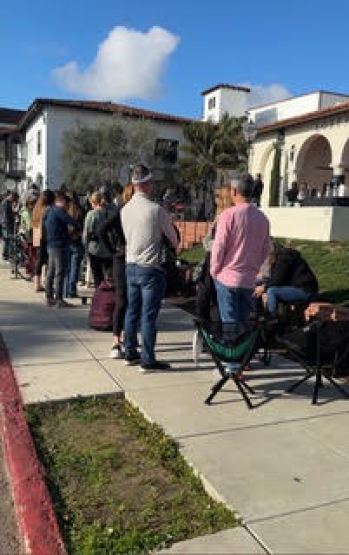In Line at the Lobero for Jack Johnson Tickets, We Were Better Together
Santa Barbarans Connect While Sitting, Waiting, Wishing in the 'Gray Zone’ for Five and a Half Hours

On Saturday, January 28, I spent five and a half hours waiting in line for Jack Johnson tickets. My husband and I started at 7:45 a.m., on the chilly sidewalk outside the Lobero Theatre, caffeinated and humming Johnson’s song “Banana Pancakes.” We were there to buy four tickets (only two tickets per person were allowed for this special event) and planning to bring our 10- and 13-year-old boys, who had grown up on his local surf vibes. My husband and I, both graduates of UCSB, feel like Jack Johnson is singing about us, with lyrics about the “DLG” (De la Guerra Dining Commons) and meeting his wife with feet covered with tar balls.
The line snaked around the building, through a corridor, and back again to the grand front steps. We huddled in between a Montessori school teacher and a video editor.
Inexperienced at ticket squatting, I envied the folks with little fold-up tables, snacks, warm blankets, and something to read. As a clinical psychologist, I noticed how my mind quickly slipped from being giddy and friendly to comparing and envious. As a yoga practitioner, I said to myself, just imagine yourself in mountain pose. Be present and steady. Meanwhile, my husband, a math teacher, was cheerily counting the number of people in line and estimating our chances.
‘Sitting, Waiting, Wishing’
In the first few hours, I learned that the Montessori teacher was born in Santa Barbara at St. Francis Hospital, and that the video editor had a baby born during COVID who refused to go in a stroller.
Three hours in, the ticket staff walking the line deemed our group “the gray zone,” behind the lucky ones with wristbands but still within the range of possibility. By then, the COVID baby, now a toddler, had come to visit and left. And my husband went off to coach 4th-grade basketball at the YMCA.

Now down to three, I realized our little group was becoming a Jack Johnson ticket Sangha — a term from contemplative practice that represents the strength you get from a community that holds space together. A Sangha remains steady where each member alone would waver.
Faced with the uncertain outcome, our motivation each waxed and waned. My mind wandered to all the other places I could be and what I could be doing. I thought about the seminal psychology study called A Wandering Mind Is an Unhappy Mind, but was jolted back to the present when one in our Sangha said, “Look at the mountains. Aren’t they beautiful from here?”
We shuffled around the El Centro Building and the new Fresco Café, where I dipped in to buy snickerdoodles to share. We peeked into a little bulk shop of natural goods, where I bought lavender oil and Epsom salts, dreaming of a place to soak my feet. I walked down the line, dropping essential oil into strangers’ open palms. Stay calm. There is still hope! Our corridor between Marshalls and the parking lot smelled like a spa.
This experience was becoming a test of our psychological flexibility — a term describing your capacity to stay engaged and committed to your values, even in difficulty. There are more than 1,000 randomized controlled trials on this super-skill, which has been shown to help anxiety, insomnia, depression, addiction, and work performance. In our sample size of three, it was proving helpful for waiting in line. We practiced acceptance and commitment.
‘Open Mind’
Three hours in, we got another report from the ticket staff. One agent said our chances were “slim to none.” But the second agent said, “You still have hope!” Like the mind, there’s often a pessimist and an optimist, side by side, both giving shady advice.
We paid attention to neither and continued shuffling along, one foot every 10 minutes, fully present.
My mom was downtown hanging her paintings for a show at Gallery 113 and came by for a visit. Another Sangha member’s parents, who were up for the weekend, stopped by to say hello. Four hours in, my husband returned with our sweaty basketball player in tow. The group welcomed my son like they would an old friend’s kid. “We’ve heard all about you! Did you win?”
When we reached the Lobero steps, the optimist ticket agent started passing around a pad of paper to take down names. Things weren’t looking good, but he still smiled. We pulled out our phones and started taking each other’s names and numbers.

‘Better Together’
We had formed something here, in line, waiting in uncertainty together. There was steadiness, security, and warmth in our little group. I felt safer knowing these people lived in my hometown.
I joked that this was all a psychological experiment on bonding. One Sangha member said, “They should make leadership teams stand in line for Jack Johnson tickets. It could be a powerful group intervention.”
I had recently interviewed Dr. Robert Waldinger, the director of the longest-running scientific study on happiness and health — the 80-year-old The Harvard Study of Adult Development — which looks at variables contributing to longevity, heart disease, cancer, and well-being. The study’s conclusion was not a surprise to our little group. Relationships are the most critical factor in both your health and happiness. Waldinger is a psychiatrist and a Zen priest who believes the three keys to healthy relationships are curiosity, generosity, and attention. Notice the good in people and be fully present for them.
We had spent our day doing just that. Our waiting together had expanded my perspective, what researcher Erin Westgate calls “psychological richness.” No matter where we stand, there are likely to be people surrounding us who we could befriend, lean on, and offer support. Whether we are standing in line or digging out mud from each other’s drains, we are all connected.
‘Don’t Look Now’
By the time we reached the front of the line, I was deep into a conversation about my podcast with the video editor: Maybe we could collaborate on something? My husband tapped my shoulder to turn around. The young couple in front of us stood frozen in shock. Tickets just sold out to the person in front of them. The line ended here. Our little ticket Sangha wasn’t going to make it. We huddled together on the steps of the Lobero, just a few feet from where we started that morning.
What if this was the very experience we were hoping for in attending a Jack Johnson concert in the first place? Connection, mountain views, good Santa Barbara vibes, and time together being curious, generous, and present. We really were Better Together.
Diana Hill, PhD, is a clinical psychologist, author, and host of the popular psychology podcast Your Life in Process. Born and raised in Santa Barbara, Diana enjoys sunrise swims while her 13-year-old surfs with Santa Barbara Middle School and teaches yoga to her 10-year-old’s class at Santa Barbara Charter School. To the tunes of Jack Johnson, of course!
Support the Santa Barbara Independent through a long-term or a single contribution.




You must be logged in to post a comment.